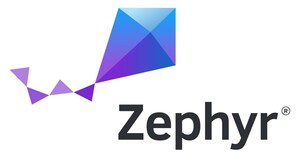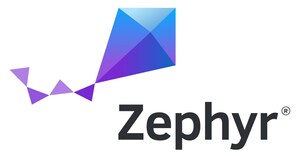SAN FRANCISCO, June 3, 2021 /PRNewswire/ -- The Zephyr™ Project, an open source project at the Linux Foundation that builds a safe, secure and flexible real-time operating system (RTOS) for resource-constrained devices, continues to gain momentum with its 5th anniversary this year. To celebrate the milestone, the Zephyr Project is hosting its inaugural Zephyr Developer Summit on June 8-10. The virtual event, which is free to attend, features several Zephyr leaders presenting real-world use cases, best practices, tutorials and more.
Happy 5th Anniversary
Launched in 2016 by the Linux Foundation, the Zephyr Project has continued to grow its technical community each year. Today, almost 1,000 contributors have helped the project surpass 50,000 commits building advanced support for multiple architectures such as ARC, Arm, Intel, Nios, RISC-V, SPARC and Tensilica and more than 250 boards.
The first-ever Zephyr Developer Summit will offer community members a chance to learn more about the fastest growing RTOS in an informal educational environment.
"We are kicking off our first Developer Summit with an impressive line-up of Zephyr thought leaders and ambassadors for the growing Zephyr community of contributors and users," said Joel Stapleton, Chair of the Zephyr Project Governing Board and Principal Engineer Manager at Nordic Semiconductor. "The strength of engagement the project has with its members and IoT solution providers reflects the importance of open source efforts to build secure and safe embedded technologies for increasingly connected applications in industrial, smart home, wearables and energy; and for computing platforms integrating microcontrollers with ever-increasing capabilities and functions."
Sample summit sessions include power management, USB support, motor control; user presentations that showcase Zephyr with Renode and TensorFlow Lite and RISC-V and contributor spotlights for securing MCUBoot, using OPC UA, energy-efficient device testing and developing hardware. Proposals were reviewed by the Programming Committee, which includes Anas Nashif, Intel; Carles Cufi, Nordic Semiconductor; Jonathan Beri, Golioth; Keith Short, Google; Maureen Helm, NXP; and Olof Johansson, Facebook. To see the complete schedule, click here. The registration deadline is June 4, click here to register.
The U.S. Executive Order on Cybersecurity
Less than a month ago, the United States White House released an Executive Order on Improving the Nation's Cybersecurity that addressed the malicious cyber attacks that have become more frequent in the last few years. In a blog, the Linux Foundation responded how Zephyr RTOS, along with several other projects, has already built some of the support needed for a more secure future. Zephyr is able to generate Software Bill of Materials (SBOMs) automatically during the build and this capability will be available in the upcoming 2.6 release. It is one of the few open source projects that is a CVE Numbering Authority(CNA) and has an active Project Security Incident Response Team(PSIRT) that manages responsible disclosure of vulnerabilities to product makers.
Product creators using zephyr can sign up for free to be notified of vulnerabilities.
"SBOMs can communicate details about a software package's contents, being able to understand exactly which source files are included in a resource constrained software image is key to understanding if it may be vulnerable to an exploit," said Kate Stewart, Vice President of Dependable Embedded Systems at the Linux Foundation. "SBOMs created by manual processes can often be incomplete, incorrect or out-of-date as a software package advances. By being able to generate the SBOM during the build, and take it to the source file level, not just the component level, better diagnosis and detection of vulnerable states is possible and addresses some of the best practices mentioned in the EO. Zephyr is being used today in thousands of wearables and other products with constrained environments. By automatically creating SBOMs during builds, the development process becomes easier, more efficient and improves maintainability in field."
Zephyr's Growing Ecosystem
Today, the Zephyr Project also welcomes AVSystem, Golioth, Pat-Eta Electronics, RISC-V and RISE Research Institutes of Sweden to its global RTOS ecosystem. These new members join Adafruit, Antmicro, BayLibre, Eclipse Foundation, Facebook, Fiware, Foundries.io, Google, Intel, Laird Connectivity, Linaro, Memfault, Nordic Semiconductor, NXP, Oticon, Parasoft, SiFive, Synopsys and teenage engineering, among others.
"We see amazing opportunities for IoT deployments involving resource-constrained devices operating in cellular LPWA networks," said Marcin Nagy, Product Director for IoT, AVSystem. "We are sure that combining the Zephyr RTOS with our expertise in the Lightweight M2M standard will contribute to the acceleration of secure and standards-based IoT launches."
"We can speak at length about the technical merits of Zephyr - the kernel design, native networking, scalable board support model and so on - but the largest differentiator is the community," says Jonathan Beri, CEO of Golioth. "From chipset vendors to ecosystem players, it feels like we're rising the tide for everyone to make the most secure & reliable open source RTOS in the market and we couldn't be more excited to contribute to the project and community."
"We are happy to be part of the Zephyr Project and hope to bring it more into the academic environment, especially within STEM (Science Technology, Engineering and Mathematics)," said Sanyaade Adekoya, Developer, Programmer and Lecturer at Pat-Eta Electronics. "It has been challenging to bring RTOSes within the academic research sector and getting them in the hands of undergraduate learners. Our research extends the use of Zephyr RTOS in IoT, Edge Computing, Robotics, Smart and Wearable devices. The Zephyr Project will be a driving platform for our students that will make it easier for them to create ideas, projects, innovations and more. We look forward to showcasing our students' Zephyr-related projects."
"RISC-V and Zephyr were both designed to drive innovation in the hardware space with open source technologies that are accessible to everyone," said Mark Himelstein, CTO of RISC-V. "Many of our members are already taking advantage of the flexibility of RISC-V and Zephyr to design end-to-end open source solutions for resource-constrained devices. We look forward to collaborating with the Zephyr Project to offer even more opportunities for the open source community to innovate."
"Zephyr RTOS enables us to rapidly prototype Thread wireless networks and is an excellent research platform for our work in IoT security," said Samuel Lindemer, Research Engineer at RISE Research Institutes of Sweden. "The interactive shell and configuration menu make it intuitive for new users, and the open-source community support is unparalleled."
To learn more about Zephyr RTOS, visit the Zephyr website and blog.
About the Zephyr™ Project
The Zephyr Project is a small, scalable real-time operating system for use on resource-constrained systems supporting multiple architectures. To learn more, please visit www.zephyrproject.org.
About the Linux Foundation
Founded in 2000, the Linux Foundation is supported by more than 1,000 members and is the world's leading home for collaboration on open source software, open standards, open data, and open hardware. Linux Foundation's projects are critical to the world's infrastructure including Linux, Kubernetes, Node.js, and more. The Linux Foundation's methodology focuses on leveraging best practices and addressing the needs of contributors, users and solution providers to create sustainable models for open collaboration. For more information, please visit us at linuxfoundation.org.
Media Contact:
Maemalynn Meanor
[email protected]
SOURCE The Zephyr Project

WANT YOUR COMPANY'S NEWS FEATURED ON PRNEWSWIRE.COM?
Newsrooms &
Influencers
Digital Media
Outlets
Journalists
Opted In





Share this article